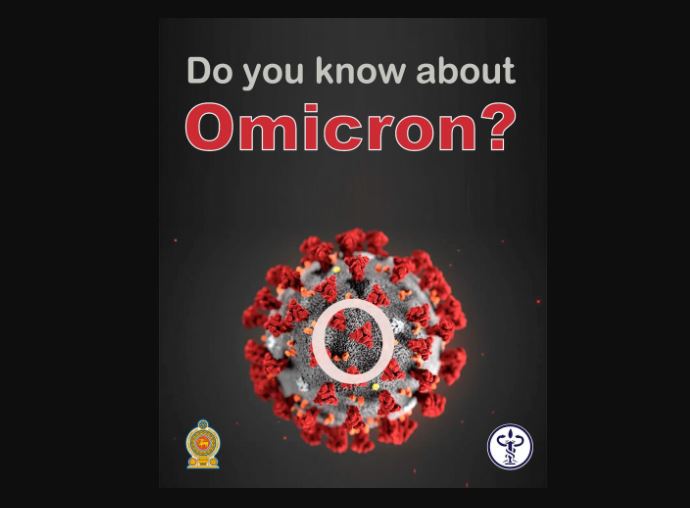Another 4 patients who have contracted the Omicron variant of Covid-19 identified in the Country says Dr. Chandima Jeewandara reports Hirunews.
Possible transmission of the Omicron Variant of COCID19 and higher risk of infection with gatherings during the festive and New Year Season, Sri Lanka Medical Association (SLMA) warns.
The Sri Lanka Medical Association (SLMA), along with the Inter Collegiate Committee, request all Sri Lankan citizens above 60 years of age to kindly ensure that they receive the booster doses of the Pfizer Vaccine against COVID-19 infection, made available by the Government for the people of Sri Lanka.
Dr. Chandima Jeewandara stressed the need for those who have not yet been vaccinated to be vaccinated immediately, saying that there is no need to panic over the Omicron variant as the booster dose increases immunity. Dr. Jeewandara also stressed the importance of adherence to public health regulations.
‘Omicron may spread faster than the other four coronavirus strains that have existed so far, and it can be infected to a person even after recovering from COVID-19’, said Professor Neelika Malavige. She pointed out that within the next two to three weeks it will be possible to get a clear idea of the behavior of the Omicron variant, adding that if immunity is high, there is no need to fear mutant variants.
?? ??? ???? ????? “???????”?
We have now spent nearly two years battling with COVID 19 and during this time it was established that over time the original virus undergoes mutations to give rise to different variants. Moreover, it was also acknowledged that development of such mutations is more likely in environments conducive to spread of COVID 19 infection. As a consequence, the World Health Organization and other expert organizations repeatedly emphasized the importance of equitable distribution of vaccines and other facilities and kept reminding us that “ no one is safe until everyone is safe”
Unfortunately, there was a significant delay to obtain vaccines for low-income countries, and as a continent, Africa continued to be at high risk with the lowest vaccination coverage in the world. Therefore, the latest variant “Omicron” (B.1.1.529) from South Africa is added to the list of “variants of concern” along with alpha, beta, gamma and delta variants of COVID 19 which were responsible for the alarming COVID 19 waves seen throughout the world from time to time.
The number of COVID 19 infected patients have been increasing rapidly in all regions of South Africa following the introduction of this new variant. The Omicron variant of COVID 19 was first detected on the 09th of November 2021 and has now been confirmed to have infected people in Botswana, Belgium,Hong Kong, Israel and the United Kingdom. Additionally, Germany and the Czech Republic are reportedly conducting further tests on a group of patients suspected to be infected with the Omicron variant.
It is now revealed that the first patient suspected to have contracted the Omicron variant was a patient who was not vaccinated and also did not obtain necessary treatment for a long-term immunodeficiency disease. It has been reported that this new variant of COVID 19 virus has the potential to spread rapidly and also challenges the natural immunity produced by the infection in previously infected individuals. However, further scientific research is underway to assess its impact on the vaccines that are currently in use. Experts in the field believe that the higher number of mutations in the genome when compared with other variants is a cause for concern.
As a nation it is important to recollect the experience of facing three COVID 19 waves along with the rapid spread of Delta variant in the country which was managed without disintegration of the country’s health system. Regardless of the type of variant, strictly adhering to the basic COVID 19 preventive measures we already know such as maintaining physical distance, proper use of face masks when leaving homeland regular hand washing is our responsibility.
The protection acquired through vaccination against variants of concern such as the rapidly spreading Deta variant, is clearly evident with countries having high vaccination coverage reporting much lower number of deaths due to COVID 19 than times prior to vaccination. It is also revealed that among those who have completed vaccination, there is 84% reduction in hospitalization due to COVID 19.By obtaining both doses of the vaccine, you can receive the protection that can be achieved by completion of vaccination against COVID 19 and further enhance your level of protection by obtaining a third dose if you are eligible.





